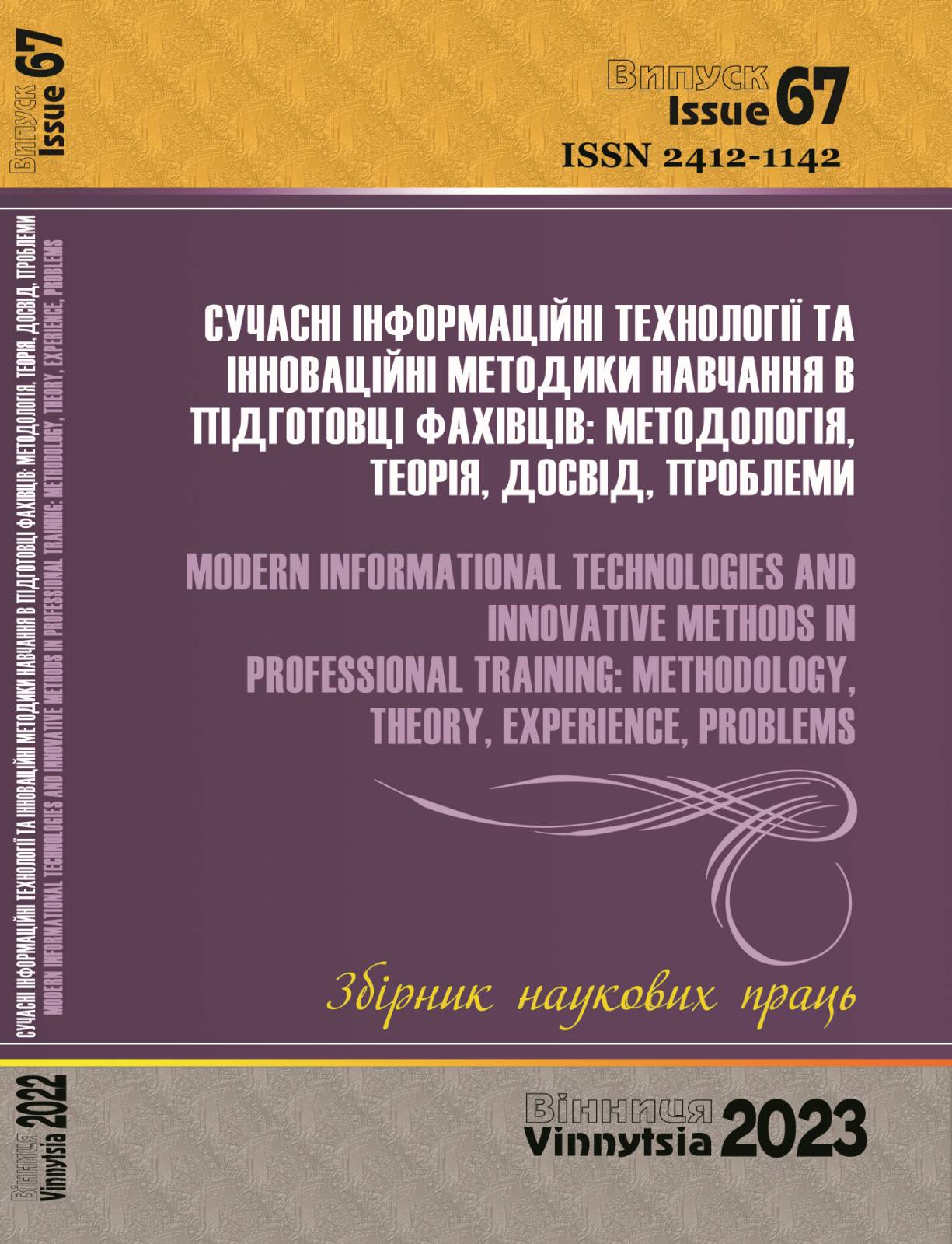TRAINING OF THE FUTURE PRIMARY SCHOOL TEACHER DURING THE REFORM OF TEACHER EDUCATION
DOI:
https://doi.org/10.31652/2412-1142-2023-67-65-74Keywords:
personal characteristics, modern primary school teacher, reform of pedagogical education, positive atmosphere, in the team, common goals, valuesAbstract
The article defines the main directions of formation of personal characteristics of a modern
primary school teacher. Methodological and theoretical-methodical foundations of training future primary
school teachers for the organization of subject-subject interaction with students are grouped, which is
translated through the following approaches: "cultural, axiological, systemic, synergistic, subject-activity,
environmental, competence, hermeneutic and dialogic, specified in the principles of: self-development,
cultural appropriateness, subject orientation, value-meaningful attitude to interaction, orientation of
learning to the values of the professional environment, text-centrism, cooperation of subjects in all
spheres of activity, freedom to choose the trajectory of development, dialogization of the educational
environment ". Pedagogical conditions that enable effective management of the process of educational
and cognitive activity of primary school teachers have been identified.
The areas of pedagogical education reform determined by the modernization of social relations on a
humanistic basis are highlighted. The conditions for the formation of personality and its formation in the
process of education are prescribed: creation of a positive mood for education; feeling equal among
equals; ensuring a positive atmosphere in the team to achieve common goals; an individual's awareness of
the value of collectively drawn conclusions; the opportunity to freely express one's opinion and listen to
one's friend; an elementary school teacher is not a means of "praise and punishment", but a friend,
adviser, senior comrade. All these conditions are met by interactive technologies, which scientistspedagogues refer to as innovative.
Downloads
References
Антонюк, Н. А., Савчук, С. В. Професійна підготовка майбутнього вчителя початкової школи до
наскрізної виховної діяльності. Академічні студії. Серія «педагогіка», 2021. (2), 19-25.
Бабакіна О. О., Толмачова І. М. Удосконалення підготовки майбутніх учителів початкової школи до
інноваційної професійної діяльності в умовах реформування загальної середньої освіти. Science and
Education a New Dimension. Pedagogy and Psychology, V (52), 113, 2017. 19-22
Гоцуляк К. Педагогічні умови підготовки вчителя в системі післядипломної освіти до диференційованого
навчання молодших школярів. Обрії. № 2(47), 2018. 47-49.
Зорочкіна Т., Вовкочин Л., Баліка Л., Зміст професійної підготовки вчителів початкової школи у закладах
вищої освіти України. Педагогіка – Education. Science and Education, 2018, 2. 167-173
Карапузова Н. Інноваційне середовище як фактор формування професійної компетентності майбутнього
вчителя початкових класів. Наукові записки. Серія: Педагогіка. 2009. 5. 44–49.
Кирилишин В. Компетентнісний підхід у розробленні професійних та освітніх стандартів. Управління
освітою. 2017. 9. С. 41–48.
Коваль Л., Петрик К. Педагогіка партнерства в координатах модернізації професійної підготовки
майбутніх учителів початкової школи. NewInception, 1, 2022. 7–13.
Комар О.А. Підготовка майбутніх учителів початкової школи до застосування інтерактивних технологій.
Теоретико-методичні аспекти. Монографія. Умань: РВЦ «Софія», 2008. 332.
Кулаков Р.С. Професійне самовизначення особистості:критерії та показники її сформованості в ранній
юності. Проблеми сучасної психології. Збірник наукових праць. К: ПНУ імені Івана Огієнка, Інституту
психології ім. Г.С.Костюка АПН України. 2010. 8. 555–565
Кучай О. Використання мультимедійних технологій у підготовці вчителів початкових класів :
навчальний посібник. Черкаси : видавець Чабаненко Ю. А., 2015. 52.
Ліннік О. О. Система підготовки майбутнього вчителя до суб’єкт-суб’єктної взаємодії з учнями
початкової школи : дис. … д-ра пед. наук : 13.00.04. Старобільськ, 2016. 519.
Ничкало Н., Лук’янова Л., Хомич Л. Професійна підготовка вчителя: українські реалії, зарубіжний досвід: наук.-аналіт. доп. / Нац. акад. пед. наук України, Ін-т пед. освіти і освіти дорослих імені Івана Зязюна
НАПН України; За ред. В. Кременя. Київ : Вид-во ТОВ «Юрка Любченка». 2021. 54.
Огієнко О.І. Формування готовності до інноваційної діяльності як важлива складова професійної
підготовки майбутнього вчителя. Педагогічні науки: теорія, історія, інноваційні технології. 2013. 7 (33).
–162.
Олефіренко Н. В. Модернізація підготовки сучасного вчителя початкової школи в умовах інформатизації
освіти. Наукові записки Ніжинського державного університету ім. Миколи Гоголя. Сер. : Психологопедагогічні науки. 2013. 3. 144-148
Попадич О. Організація управлінської діяльності як засіб педагогічно-правової підготовки майбутнього
вчителя початкової школи. Сучасні інформаційні технології та інноваційні методики навчання в
підготовці фахівців: методологія, теорія, досвід, проблеми, 2021. 71–79.
Хімчук Л. І. Дидактичні проблеми підготовки майбутніх учителів початкової школи до використання
комп’ютерних ігрових технологій у професійній діяльності. Вісник Черкаського національного
університету імені Богдана Хмельницького. Серія: "Педагогічні науки", 2020. 3. 150-158.
Хомич Л.О. Професійно – педагогічна підготовка вчителя початкових класів. К.: Магістр – S, 1998. 200.
Downloads
Published
Issue
Section
License
Copyright (c) 2023 Біда Олена Анатоліївна, Шовш Катерина Степанівна, Радик Ірина Ладиславівна, Шімон Дьенді Іштванівна, Кучай Тетяна Петрівна

This work is licensed under a Creative Commons Attribution 4.0 International License.

